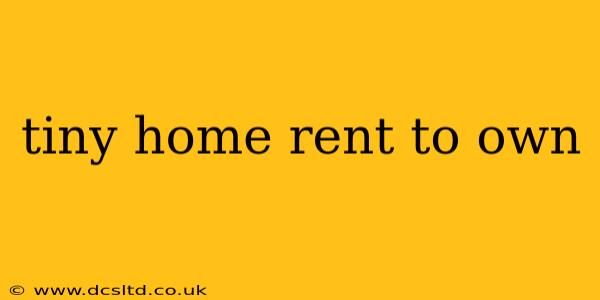The dream of homeownership is often out of reach for many, thanks to soaring housing prices and stringent lending requirements. But what if there was a more accessible route? Enter the world of tiny home rent-to-own programs. This innovative approach offers a potential pathway to homeownership, but it's crucial to understand the nuances before diving in. This comprehensive guide explores the realities of tiny home rent-to-own arrangements, addressing common questions and concerns.
What is a Tiny Home Rent to Own Program?
A tiny home rent-to-own program is a unique arrangement where you lease a tiny home from a seller with an agreement that a portion of your monthly rent will be applied towards the eventual purchase price. This differs from a traditional rental agreement, as it includes a predetermined purchase option after a specified period. Essentially, you're paying rent while simultaneously building equity in your home. This can be a particularly attractive option for those with limited savings or credit challenges who find traditional mortgages unattainable.
How Does a Tiny Home Rent to Own Program Work?
The specifics vary widely depending on the seller and the agreement, but here's a general overview:
- Initial Lease Agreement: You sign a lease agreement outlining the monthly rent, the length of the lease, and the purchase option details.
- Rent Application: A portion of your monthly rent is allocated towards the final purchase price. This amount varies but usually represents a significant chunk of your rent payment.
- Purchase Option: After a set period (often several years), you have the option to purchase the tiny home for a predetermined price, often a significantly reduced price reflecting the rent-to-own payments you've already made.
- Financing: You may need to secure financing for the remaining balance, if any, through a traditional mortgage or other loan options. This is where having a credit-building strategy is paramount.
Important Note: Always read the fine print! Understand all terms and conditions, including penalties for early termination, purchase price adjustments, and property maintenance responsibilities.
What are the Advantages of Tiny Home Rent to Own?
- Accessibility: It's a more accessible route to homeownership for individuals who might not qualify for a traditional mortgage.
- Building Equity: A portion of your rent payments contributes directly towards owning the property, unlike a standard rental agreement.
- Affordability: Tiny homes themselves are generally less expensive than traditional homes, reducing the overall financial burden.
- Flexibility: Rent-to-own agreements can be tailored to fit individual financial circumstances.
What are the Disadvantages of Tiny Home Rent to Own?
- Higher Monthly Payments: Rent payments in a rent-to-own scheme may be higher than a traditional rental, as they include a purchase element.
- Risk of Loss: If you're unable to complete the purchase at the end of the lease, you risk losing all the money paid towards the purchase price.
- Limited Flexibility: These agreements often come with less flexibility compared to traditional rentals. Moving out before the purchase option is exercised can lead to significant penalties.
- Potential for Hidden Costs: Always scrutinize the contract for hidden fees or charges that could increase your overall costs.
How Do I Find a Tiny Home Rent to Own Program?
Finding a suitable program requires diligence. Start by searching online for "tiny home rent to own" in your desired location. You can also check with local real estate agents and tiny home builders to see if they offer rent-to-own options. Network with others interested in tiny homes; word-of-mouth can be an effective way to find viable opportunities.
What are the Legal Aspects of Tiny Home Rent to Own?
Consult with a real estate lawyer to review the contract before signing any agreement. This protects your rights and clarifies the terms to ensure a transparent and legally sound transaction. Paying close attention to the legal aspects is crucial to avoid any potential future issues.
What Credit Score Do I Need for Tiny Home Rent to Own?
Credit scores are often less stringent compared to traditional mortgages, but having a reasonably good credit score will still improve your chances. Many sellers will check your credit history to assess your financial responsibility. However, unlike a mortgage, the bar for approval might be lower.
Can I get a loan to pay the remaining balance?
Yes, you might need to obtain financing for the remaining balance after completing the rent-to-own period. Your ability to secure a loan will depend on factors such as your credit score, income, and the lender's requirements.
By carefully considering the advantages and disadvantages, researching available programs thoroughly, and seeking legal counsel, you can make an informed decision about whether a tiny home rent-to-own program is the right path to homeownership for you. Remember, due diligence and a comprehensive understanding of the contract are paramount.
